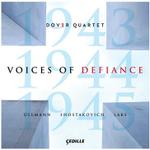|
Back
11/14/2017
“Voices of Defiance”
Viktor Ullmann: String Quartet N° 3, opus 46
Dmitri Shostakovich: String Quartet N° 2 in A major, opus 68
Szymon Laks: String Quartet N° 3
Dover Quartet: Joel Link (violin), Bryan Lee (violin), Milena Pajaro-van de Stadt (viola), Camden Shaw (cello)
Recording: Rolston Recital hall, The Banff Centre, Banff, Alberta, Canada (March 19-21, 2016)
Cedille Records 90000-173 – Liner notes in English

   
In the liner notes of the Dover Quartet’s CD, Voices of Defiance, cellist Camden Shaw speaks for the ensemble when he writes, “Recording this album was an emotional process. Even disregarding the historical context, the music is so powerful that it can bring tears to one’s eyes.” Even if one doesn’t know anything about the circumstances of the lives of composers Viktor Ullmann, Dmitri Shostakovich and Szymon Laks during World War II when they composed, the power of their music commands your attention. But when you do know the fate of these artists, trying to survive Nazi and Stalinist persecution and the carnage of a world at war, their music stands as a stunning artistic statement and witness to history...it’s as profound as Picasso’s Guernica, The Diary of Anne Frank or Wilfred Owens’ World War I poetry.
Shaw writes “The fragility and evanescence of the composers’ lives standing in stark contrast with the immortal nature of the music.” Indeed, this music resonates more than ever, 75 years later and most vividly as performed by Dover Quartet violinists Joel Link and Bryan Lee, violist Milena Pajaro-van de Stadt and cellist Camden Shaw. The vital legacy of these works couldn’t be in better artistic hands than the Dover Quartet.
The group had already been performing Ullmann’s String Quartet N° 3 on tour, and they were surprised many audience members not only knew of the piece but of Ullmann’s personal history. Ullmann was sent to a Jewish internment camp in 1944 and told that he was in transit to a work camp, but he feared, rightly, that he’d be sent to Auschwitz. He entrusted his manuscripts to a friend, probably knowing he would not survive. Within days he was murdered in the Nazi camp. Only 13 of Ullmann’s 41 compositions have survived, the two most famous being his opera, The Emperor of Atlantis, and his Third String Quartet.
Born in what is now the Czech Republic, Ullmann was a law, philosophy and music student at the University of Vienna. He returned to Prague to study with Alexander von Zemlinsky, and he was greatly influenced by Arnold Schoenberg. Ullmann’s two movement structure for the String Quartet opens with a melody full of pathos that plunges into a gushing narrative and careening into a sinister, harrowing musical expression. But Ullmann’s intimate core melody returns and with each pass, it seems more tender and, ultimately, seemingly inviolate. Indeed, it’s a riveting and disturbing musical journey.
Shostakovich composed his String Quartet N° 2 in 1944, along with his Piano Trio N° 2, all during his 19-day compositional intensive at the Soviet-run artists’ retreat. The Quartet is one of Shostakovich’s most introspective yet compositionally dazzling works. The overture itself editorializes (as pointed out in the liner notes) with passages missing a third of a chord, making them neither major nor minor, yet interpreted as either referencing music from antiquity or emotional ambivalence. The quality of equivocal temperament is very present in the Dover Quartet’s performance. Indeed, Shostakovich was caught in the middle of trying to serve many masters.
The “Recitative and Romance” [adagio] with the lead violin perhaps expresses the emotions of a Soviet soldier facing death on the battlefield. The “Waltz” [allegro] characterizes with muted instruments that accelerates into an intoxicating and disturbing dance macabre. Then the “Theme with Variations” [adagio], becomes a taut dialogue between upper and lower strings. Shostakovich’s voicings are urgent, meditative, folkloric, and by the end, musically and emotionally borderless. Shostakovich is so defiant in this work that it’s remarkable the Soviet censors didn’t red-flag it forever. Fortunately for us it lives.
Szymon Laks was born in Warsaw and as a young composer, he worked in Paris and Vienna where he played piano at silent film screenings. In his memoir, Music of Another World, he describes not only how music saved his life, but how the perverse ways music was used by the Nazis. Laks survived the death camp at Auschwitz because he was a musician and was forced to perform for the Nazis. Around the edges of the first movement (“Allegro quasi presto”) of his panoramic String Quartet N° 3, the strings swirl with lightness and drive, with shadings of somberness and then dread. The second movement (“Poco lento, sostenuto”) evokes an existential struggle of survival. Laks’ music is intense, mysterious and musically triumphal.
Dover Quartet’s technical artistry is a given, but there’s also that chamber quartet “X-factor” that can’t be forced. Undoubtedly, their ensemble synergy is luminous in this recording. These are historic compositions, and this recording is among the most important releases of this or any other year.
Lewis J. Whittington
|